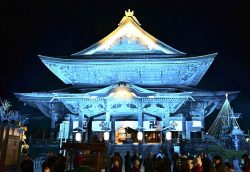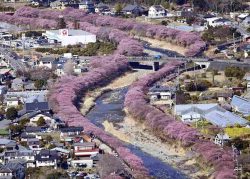Old & New video

Fourth-generation Hanaju Florist manager Ikuyo Nakase, second from left, instructs a student on the second floor of the Hanaju cafe built at the refurbished Senzen wing of the shop in Taito Ward, Tokyo. Pillars and beams used in the original construction can be seen at the cafe, which has high ceiling. The Senzen wing, said to have been built sometime during the early 20th century, was originally a residence, but was used as an office before the renovation. On Sept. 9, Nakase held a class for autumn flower arrangement in baskets at the cafe.
12:31 JST, September 24, 2023
Yanaka Cemetery in Taito Ward, Tokyo, dates from 1874 and hosts about 7,000 graves. Within its roughly 100,000 square meters, one can find the graves of many famous people, including the last shogun Tokugawa Yoshinobu, industrialist Eiichi Shibusawa and painter Taikan Yokoyama.
Near the cemetery’s entrance stands Hanaju Florist, a flower shop founded in 1870. The shop is a neighborhood landmark that Shibusawa and Yokoyama are said to have visited.
In July, the old shop was relaunched after three years of planning and renovation, with a garden, cafe and other modern features newly added. The work, based on a theme of “time travel,” was intended to allow visitors to experience “trips” through structures built in the Meiji (1868-1912), Taisho (1912-1926), Showa (1926-1989) and Reiwa (2019-) eras.

The building on the right is the Meiji wing built in 1877. To the left is the Nagaya wing, which was once used as a workspace for the flower shop. Visitors can pass through its noren curtains and enter the cafe.
The plot where Hanaju stands is long and narrow, stretching away from the street. In 2020, before the renovation, there were eight structures on the plot covering about 100 tsubo, or some 330 square meters.
The Meiji wing at the front of the plot was built in 1877 in the traditional machiya town house style, which was popular from late in the Edo period (1603-1867) to the early years of the Meiji era. It has been recognized as a tangible cultural asset by the government.

A modern terrace installed outside the Senzen wing gives the building an eclectic look.
To one side projects the Nagaya wing, which was constructed in the Edo period. And behind are the Tsunagi and Senzen wings.
For the renovation, aimed at injecting Reiwa design and technology into the historic architecture, these four structures were spruced up, and the others demolished. On the newly opened space, a garden and a cafe with 43 inside and outside seats were built.
Hanaju thrived after World War II by supplying flowers to weddings and concert halls. It had more than 20 employees by the 1960s, and founded a florist training school in the 1970s.

Low-ceilinged, tatami-mat rooms make up the second floor of the Meiji wing.
Third-generation Hanaju owner Juzaburo Sekie led the florist industry and served as president of the All Japan Florist’s Association.
But the shop’s finances hit hard times after his death. Three years ago, a local advertising and real estate company took over Hanaju’s land, buildings and business.
Ikuyo Nakase, the great-granddaughter of Hanaju’s founder and the fourth-generation Hanaju manager, has been running the business as an employee along with her daughter, Marin Fujiwara, who is set to be the shop’s fifth-generation manager. With the help of a nonprofit specializing in the use of old traditional-style houses, Nakase is preserving the building’s history and passing on her florist skills.
Hanaju provides “not only a mix of old and modern structures but also a magical space filled with the scent of flowers,” said a company worker in her 20s who visited the cafe from Koto Ward, Tokyo, after learning about the shop on Instagram.

Marin Fujiwara works at the Hanaju store on the first floor of the Meiji wing. The plaster walls and wooden ceiling are on full display. Wood-framed sliding glass doors and wooden tables were added during the renovation.
Related Tags
Top Articles in Features
-

Tokyo’s New Record-Breaking Fountain Named ‘Tokyo Aqua Symphony’
-

Sapporo Snow Festival Opens with 210 Snow and Ice Sculptures at 3 Venues in Hokkaido, Features Huge Dogu
-

Tourists Flock to Ice Dome Lodge at Resort in Hokkaido, Japan; Facility Invites Visitors to Sleep on Beds Made of Ice
-

High-Hydration Bread on the Rise, Seeing Increase in Specialty Shops, Recipe Searches
-

Heirs to Kyoto Talent: Craftsman Works to Keep Tradition of ‘Kinran’ Brocade Alive Through Initiatives, New Creations
JN ACCESS RANKING
-

Japan PM Takaichi’s Cabinet Resigns en Masse
-

Japan Institute to Use Domestic Commercial Optical Lattice Clock to Set Japan Standard Time
-

Israeli Ambassador to Japan Speaks about Japan’s Role in the Reconstruction of Gaza
-

Man Infected with Measles Reportedly Dined at Restaurant in Tokyo Station
-

Videos Plagiarized, Reposted with False Subtitles Claiming ‘Ryukyu Belongs to China’; Anti-China False Information Also Posted in Japan























